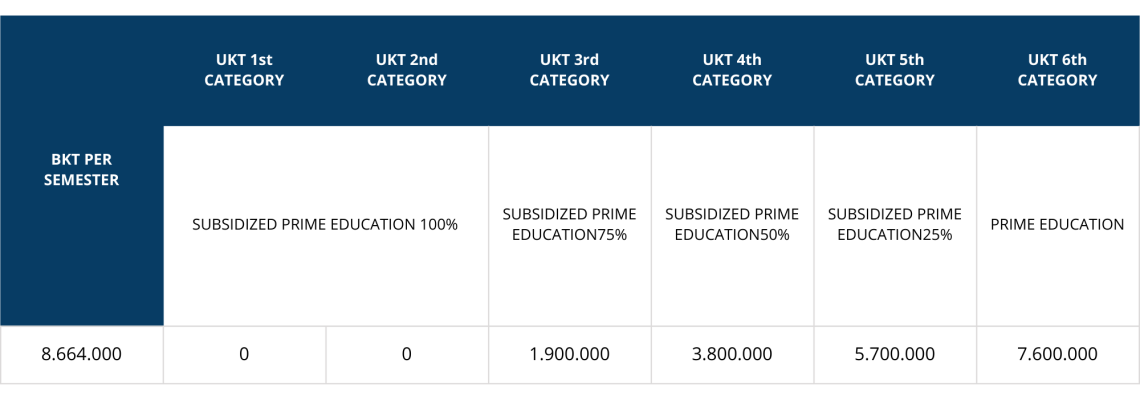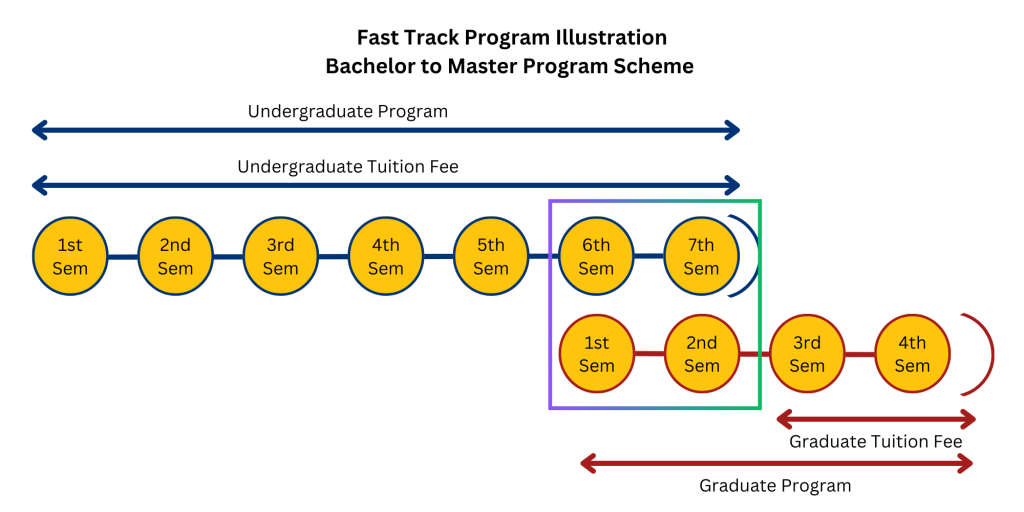Prospective students for the Arabic Study Program at the Faculty of Cultural Sciences, Universitas Gadjah Mada, can apply through four national admission pathways, the National Selection Based on Achievement (SNBP), the National Selection Based on Tests (SNBT), the UGM Independent Examination for Outstanding Candidates (UM UGM PBU), and the UGM Independent Computer-Based Test (CBT). An international admission pathway is also available.
National Selection Based on Achievements (SNBP) is a selection path based on students’ academic scores at their school of origin, which is managed by the Indonesian Higher Education Entrance Test Institute (LTMPT). The SNBP activity schedule follows LTMPT policies.
National Selection Based on Test (SNBT) is a selection path based on the results of a computer-based test managed by the Indonesian Higher Education Entrance Test Institute (LTMPT). The SNBT activity schedule follows LTMPT policies.
3.1. PBUTM (Penelusuran Bibit Unggul Tidak Mampu)
This selection path is held as a form of UGM’s concern for prospective participants with high academic abilities and achievements in the fields of Science and Technology, Sports, or Arts who are constrained by economic limitations.
3.2. PBUB (Penelusuran Bibit Unggul Berprestasi)
This selection path is intended for the winners of the competition in the fields of sports, arts, and IPTEK (Science and Technology) related to the chosen Study Program. The recognized championship levels are provincial, national, and international and/or the championships organized by UGM, proven by a certificate or charter. The winner who is a member of a group championship must be proven by the presence and participation of all team members during the competition.
3.3. PBU Afirmasi dan 3T (Penelusuran Bibit Unggul Wilayah Afirmasi dan Daerah Tertinggal, Terdepan, dan Terluar (3T) penyelenggaraan Kegiatan Tridharma UGM)
In the implementation of the UGM Tridharma of Higher Education, this selection path is intended for high school students who come from Affirmative Regions and Disadvantaged, Frontier, and Outermost Regions (3T) who meet the general criteria.
This selection path uses a combination of UM UGM CBT scores organized by UGM and SNBT scores. This selection path provides an opportunity for high school or Paket C graduates to take part in the selection by choosing 2 (two) Study Programs in the Undergraduate Program and/or Applied Undergraduate Program. The UM UGM CBT exam groups are divided into 3 (three) types:
Science and Technology (Saintek) exam group;
Social and Humanities (Soshum) exam group; or
Mixed Exam Group (Saintek and Soshum).
Each prospective student can only take one of the exam groups. For more information UM UGM Website .
For international students who are interested in applying and accessing scholarships, the registration process can be done through the UGM Office of International Affairs (OIA). OIA UGM acts as an international service center ready to assist international students in understanding admission procedures and scholarship requirements and facilitate their needs during their studies at UGM. Website Admission UGM.
To obtain the degree of bachelor in Arabic (S.S.), each student has to finish and get at least 144 credits / 216 ECTS (111 credits for compulsory courses and 33 credits for elective courses) in four years. In addition, this study program also provides the students to finish their studies in three and a half years. The compulsory courses distribution per semester can be seen in the following tables:
Students can choose elective courses that have been divided into each semester below:
Regarding information on the curriculum and syllabus of the study program, prospective students can access it via the following link:

For prospective students of UGM’s admission test (UM), an Institutional Development Fee of Rp30,000,000.00 (thirty million rupiah) for the fields of science, technology, and health and Rp20,000,000.00 (twenty million rupiah) for the fields of social sciences and humanities, is only imposed on students who have good economic abilities or who do not get subsidized prime education.
Facilities of the Faculty of Cultural Sciences UGM
UGM is committed to supporting and facilitating teaching and learning activities as well as student welfare with facilities such as:
a. UGM Central Library and Faculty of Cultural Sciences Library Facilities
UGM Central Library offers comfortable reading rooms, group discussion areas, silent rooms for full concentration, and fast internet access via Wi-Fi in all areas. Featured services include book loans, reference consultations, and access to international journals. UGM Library also provides a digital platform to access the collection online anytime and anywhere. For more information about this facility, visit FIB Library Website. For students of the Faculty of Cultural Sciences (FIB), the FIB library provides a special collection of literature in the fields of culture, literature, and linguistics, equipped with a reading room that supports comfortable learning.
b. Laboratorium
The FIB Language Laboratory (Language Lab) is a classroom facility specifically for language learning activities, especially listening activities. The Language Lab is located on the second floor of the Zoetmoelder building, better known as Building G. This laboratory consists of three classes (G201, G202, and G203), each class having a capacity of 30 students and one lecturer. The facilities in this Language Lab are a complete set of audio equipment and two TVs. With this facility, students can listen to the lecture material in the listening section more comfortably because each student gets an audio amplifier.
c. E-Learning Facilities
Access to online learning platforms such as eLok and Integrated Information System/Sistem Informasi Terintegrasi (SIMASTER).
d. Coworking Space
The Faculty of Cultural Sciences UGM provides a coworking space for students to discuss and work on assignments.
a. UGM Residence
In a comfortable, safe, and strategic environment, UGM Residence offers various types of rooms equipped with supporting facilities such as beds, study tables, wardrobes, Wi-Fi access, and a common room for interaction and discussion. Each dormitory is also equipped with a shared kitchen, green area, and 24-hour security facilities, creating a conducive living atmosphere for studying and socializing. Its location around the UGM campus makes UGM Residence an ideal choice for students, both domestic and international, who prioritize comfort and productivity in their daily lives. For more information about this facility, visit residence.ugm.ac.id
b. Campus Bikes
UGM Campus Bikes are provided by Universitas Gadjah Mada to support the mobility of students, lecturers, and academics around campus. This program aims to create an environmentally friendly campus, reduce traffic congestion, and encourage a healthy lifestyle among academics. For more information about this facility, visit Sepeda.Kampus
c. Campus Bus (Trans Gadjah Mada)
Campus transportation services are provided by Universitas Gadjah Mada to facilitate the mobility of academics around the campus. This service aims to support fast, efficient, and environmentally friendly mobility on the fairly large UGM campus. For more information about this facility, visit Instagram @aset.ugm
In addition to the scholarships provided by Ditmawa, the Arabic Study Program also offers an Alumni-Funded Scholarship. This program is designed to provide additional support to students in need and a form of alumni dedication to advancing education on campus. This scholarship helps students focus on completing their studies by reducing their financial burden of education.
In addition to the scholarships provided by Ditmawa, the Arabic Study Program also offers an Alumni-Funded Scholarship. This program is designed to provide additional support to students in need and a form of alumni dedication to advancing education on campus. This scholarship helps students focus on completing their studies by reducing their financial burden of education.
The Arabic Literature Study Program offers a Fast Track program, an accelerated education pathway that allows outstanding students to continue their studies from the undergraduate level directly to the postgraduate level. This program is designed to support students’ optimal academic development, especially in the fields of Middle Eastern Cultural Studies/Kajian Budaya Timur Tengah (KBTT), Literature, and Linguistics.
Through this program, students who meet the criteria can start taking master’s program courses while still in the final semester of their undergraduate level. With an efficient curriculum integration system, students can complete two levels of education in a shorter time than the regular path. The following is the scheme applied in the Arabic Study Program in Fast Track program:

Prospective students are not required to be able to speak Arabic before entering the Arabic Study Program. This study program is designed to teach Arabic from basic to advanced levels. During lectures, students will learn Arabic gradually, starting from speaking, listening, and reading to writing skills. Therefore, even if they do not have a previous Arabic background, students will still receive adequate education to master the language during their studies in this study program.
Yes, the Arabic Study Program has a Student Association called IKMASA (Ikatan Mahasiswa Sastra Arab). IKMASA is a student organization that accommodates students in various academic, social, and cultural activities. IKMASA also often holds events, discussions, and activities that support student self-development. For more information and to participate in IKMASA activities, you can visit the Instagram account @sastraarabugm.
Graduates of the Arabic Literature Study Program have job opportunities in various fields, including academics, researchers, translators, counselors, entrepreneurs, the government sector, journalism, diplomacy, and various other fields that require an understanding of the Arabic language and culture.
The Arabic Study Program offers three fields of study that can be chosen by students, namely: